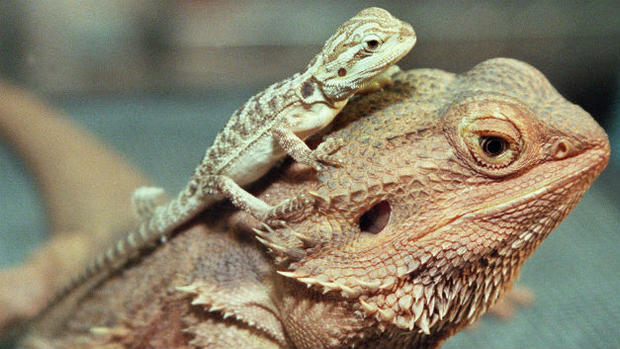Ask An Expert: 5 Tips For Owning Your First Reptile
In small Boston homes, it can be difficult to own traditional pets like large dogs. Instead, owning a reptile is becoming a popular choice for city residents that are tight on space but still seek the companionship of a pet. Many reptiles can be surprisingly social and love human attention, which makes them great pets for families. But before running to an animal shelter or pet store, make sure to thoroughly research the requirements of reptile ownership. Here to give us a few pointers is Dr. Elisabeth Simone-Freilicher of Boston's widely respected Angell Animal Medical Center.
Angell Animal Medical Center
350 S Huntington Ave.
Boston, MA 02130
(617) 522-7282
www.mspca.org
Boston based veterinarian Elisabeth Simone-Freilicher specializes in avian and exotic medicine. She is one of less than 150 board-certified avian veterinarians. And though she specializes in birds, she also loves working with other non-traditional pets including small rodents and reptiles. She is passionate about educating pet owners and is a frequent event panelist and lecturer and contributes to publications including Veterinary Practice News, Critters USA, andRabbits USA, as well as peer-reviewed case reports for the Journal of Avian Medicine and Surgery.
Here Dr. Simone-Freilicher shares some of her top pieces of advice for first time reptile owners. The true cost and time commitment of owning a pet is often overlooked, so we are excited to share this guide with Boston residents and all perspective reptile parents!
While reptiles make great pets for a majority of people, they do pose risks to people that are immunosuppressed. So those with HIV/AIDS and with certain autoimmune diseases should weigh the risks carefully, do plenty of research, and consult their doctors before purchasing or adopting a reptile. This is because reptiles can carry salmonella. Because of this possibility it is also advised by the Centers for Disease Control (CDC) that all people in the home are above the age of 5. This ensures that everyone is mature enough to wash hands after handling the animals and before preparing food or conducting other household activities.
There are hundreds of reptiles to consider as a pet. Dr. Simone-Freilicher suggests that first time reptile owners go for a leopard gecko or a bearded dragon if they are interested in lizards because they are rather mello but also social. These species enjoy human company and don't have overly complicated care requirements. Ball pythons and corn snakes are great options for a first snake because they are also fairly easy to manage and are sociable with proper attention. As far as turtles go, Greek and Russion tortoises are great choices, but require slightly more care than the lizards and snakes listed above.
Reptiles should not be purchased on impulse, especially for first time reptile owners. All require some amount of care, but some species have truly specialized needs, so make sure you know what you're getting into. Reptiles should have a properly lit enclosure, ideally with access to sunlight and a UVB lamp. Be ready to provide the animal with a nutritious diet that includes calcium and other vitamins that reptiles depend upon for survival.
Related: Boston's Best Bars with Games
Make sure to plan for the ongoing care and costs of the animal. Especially if you are an adult purchasing the reptile for a child. In many cases, reptiles seem like a great gift or first pet, but then are neglected or returned because of costs and a lack of time. Reptiles need to be properly fed, socialized, and handled on a regular basis. Their cages need to be cleaned and they need human interaction in order to make great pets.
Having a healthy pet keeps everyone happy. Though it may seem as though reptiles don't need to see a vet as often as dogs or cats do, it is still strongly encouraged that all pet reptiles be taken for an annual checkup. This ensures the vitality and happiness of your pet for years to come!
Related: Best Iced Coffee in Boston




